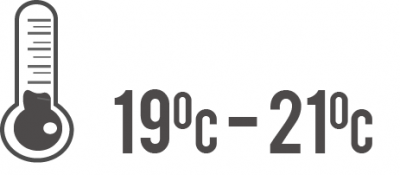Our aim is to provide a comfortable working temperature for our staff and students while reducing our impact on the environment.
Keeping our buildings warm in the winter and cool in the summer is responsible for more than half of UCL’s total carbon footprint, leading to over 40,000 tonnes of CO2 every year. That’s equivalent to 4,000 homes energy use and it would take over a million trees to absorb that much CO2.

In a recent consultation on our new Carbon Management Plan, respondents gave examples of spaces where energy is being wasted through excessive heating or cooling. Some spaces have legacy heating and cooling problems, including lack of effective controls, which UCL is working to rectify, but some are being heated or cooled more than they need to be. We have therefore developed a Heating and Cooling Policy.
The policy has been developed by UCL Estates, utilising expertise from the UCL Energy Institute, and the guidelines match good practice across the Higher Education sector. This policy was endorsed by UCL’s Estates Management Committee in 2016.
Read UCL's Heating and Cooling Policy
Key headlines in the policy:
Heating

In winter, autumn and spring UCL will aim to maintain spaces at a temperature of 19 - 21°C while they are occupied. Both of these ranges are in line with guidance from the Chartered Institute of Building Services Engineers.
Air conditioning
Wherever possible natural ventilation, for example openable windows, will be used to keep spaces cool. Air conditioning will only be provided where temperatures regularly exceed 28°C, for example due to high occupancy levels or heat generated by equipment. Where air conditioning is provided UCL will keep temperatures below 25°C.
When will heating or cooling be provided?

We will keep teaching, research and office spaces a comfortable temperature between 8.00am - 6.00pm, Monday to Friday. Student spaces, libraries and residences will be heated/cooled according to their current opening hours. Where there are regularly late teaching hours or events taking place, these will be accommodated. Laboratories and other spaces which require specific temperatures in order to conduct research will not be altered.
Can I request heating/cooling to be provided outside of these hours?
Where significant levels of out-of-hours working is unavoidable, UCL Estates will work with departments to maintain a flexible approach – we have developed a form for these requests to assess the business need and the number of people that would like to work outside of our standard hours. Complete form here.
My learning or working environment is too hot or too cold

Too cold?
UCL has a historic estate and we are in the process of improving some of our older heating systems. However, where you think that your space is consistently below 19degress please do log a request through the customer services desk so we can investigate. Log a request here. If you’re not sure what temperature it is you can request a thermometer strip from estates.energy@ucl.ac.uk.In the short term, these spaces may continue to experience problems due to building condition or use of space; however the new policy will make it easier to identify areas where adjustments to controls or repairs to equipment will have the greatest effect.
Too hot?
Air conditioning would only be considered where temperatures are consistently above 28 ºC and only after all other more environmentally-friendly alternatives have been assessed. If you feel that your space frequently exceeds 28ºC (e.g. consistently over the summer) you may apply to estates to install air conditioning. We will install temperature logging to understand the temperatures you are experiencing and if approved the system would need to be paid for by your Department. Access the request form here.
Using an electric heater?
Only electric heaters that have been provided by UCL Estates due to inadequate heating may be used. Using electric heaters can make your colleagues cold. They prevent heating being provided in other parts of a building as they cause false high temperatures to be sensed by the control system preventing other parts of the building being heated.
How else can I save energy?
If you’re interested in other ways to save energy or would like to know how much energy your building uses please see Positive Climate.
 Close
Close

